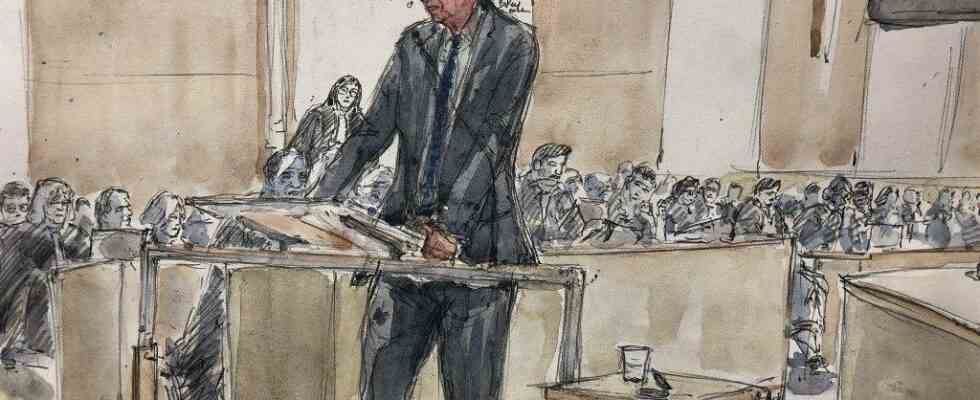At the specially composed Court of Assizes of Paris,
“We can bring in our first witness,” announces the president of the specially composed court of appeal, Laurent Raviot, turning to the bailiff. Holding in his right hand an orange file, dark suit, sunglasses, François Molins crosses the courtroom and approaches the bar. Today attorney general at the Court of Cassation, the 69-year-old magistrate was, at the time of the attack in Nice, public prosecutor of Paris, in charge of terrorism cases at the national level. A position he held for seven years, before being appointed to the highest post of magistrate of the public prosecutor’s office in France.
Hands resting on the desk, François Molins asks the court for permission to read his notes, in which he summarized the main lines of the terrorist threat that hung over the country at the time, supported by “the deadly propaganda of Daesh “. Paris, Magnanville, Saint-Étienne-du-Rouvray, Saint-Quentin-Fallavier… With the series of attacks committed in France from 2015, the public has become accustomed to the face of the magistrate who has held, in a few years, about fifty press conferences. His hearing, this Monday morning, particularly focuses the attention of the civil parties who wonder about the reasons which led the magistrate to order autopsies on the bodies of certain victims.
Three criteria
François Molins is “aware that this is a painful subject”. “But we order an autopsy not to cause pain but because we need it,” he says. Nevertheless, the relatives of 14 people, including 4 children, want to know why they were cut up and emptied of their organs, while the cause of their death seemed obvious: hit by a 19-tonne launched at full speed on the Promenade des Anglais. “In forty-five years, I have never seen a criminal case in which there was no autopsy on the grounds that we knew the causes of death”, sweeps the former public prosecutor of Paris.
Three criteria had been set by the prosecution to determine the need for an autopsy, he explains. It was first to be used to “scientifically establish the causes of death” if the external examination of the body was not enough. On the other hand, if the victim had been taken care of by the emergency services, the autopsy aimed to “distinguish between things” between the injuries caused during the attack and the complications linked to “possible medical negligence”. Finally, it was practiced if there was a suspicion of attack by bullet.
” Overzealous “
After the attack, several families were deeply moved by noting that victims had been stripped of their organs during autopsies without their being informed. “My feeling is that the removal of all the viscera was not essential”, affirms François Molins, also acknowledging the shortcomings in the information to the families. He does not want “to accuse the Forensic Institute (IML) of Nice, which has worked well”. But believes that its ex-director, Gérald Quatrehomme, showed “overzealousness” by removing organs which were placed under seal, in case additional analyzes were necessary. What the families concerned learned only by reading the procedure, even at the hearing for those who belatedly constituted civil parties.
A working meeting had however been organized between the magistrates of the anti-terrorist section of the Paris prosecutor’s office and the team of the IML of Nice, on July 15. But “the question of organ harvesting” had not been addressed, underlines François Molins. And for good reason. In Paris, the usual protocol is to “take a sample” of viscus. When he gives his instructions that day, François Molins “does not imagine that it will be otherwise”.
“We lacked vigilance on this”
In reality, he only learned late, when the case was in the hands of the investigating judges, what had happened. The body of a young American victim of the attack was notably autopsied a second time after being repatriated to the United States. Stupor of the doctors on site: “there were no longer any viscera inside. “But” at the time, we did not know because we had not been informed, nor consulted, “he adds, specifying that no magistrate was available to attend the autopsies performed in Nice. .
Heart, liver, lungs, kidneys… These organ removals, breathes the Attorney General, “were not justified”. “We lacked vigilance on this, I want to admit it”, he adds, assuring that “if it had to be done again, there would not have been any systematic samples”. Families have asked the courts for the restitution of the victims’ organs. But, as recalled by Me Virginie Leroy, the lawyer for the Promenade des Anges association, some doubt that it is indeed those of their loved one. For these cases, “I don’t see any other solution than to do DNA analyses”, declares François Molins, specifying that he is speaking on his behalf. Some applause is heard in the courtroom.

